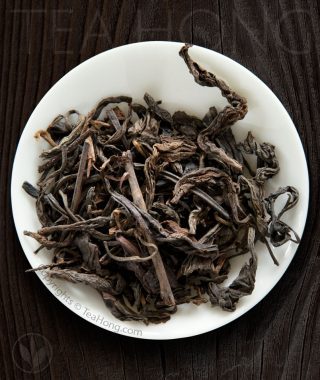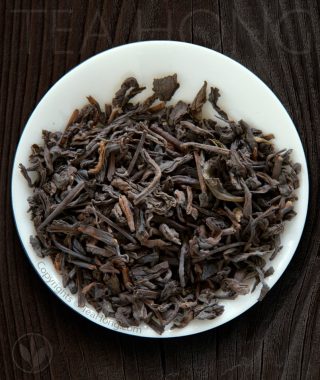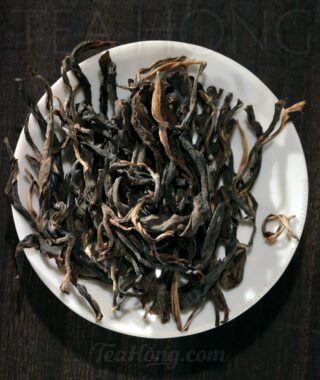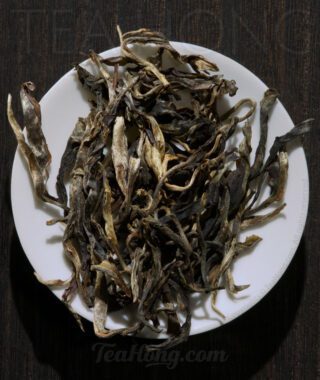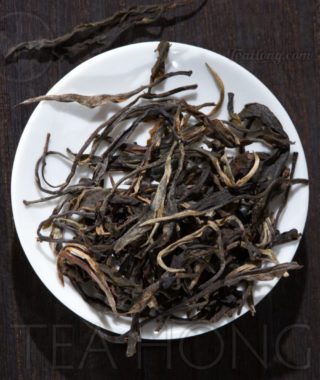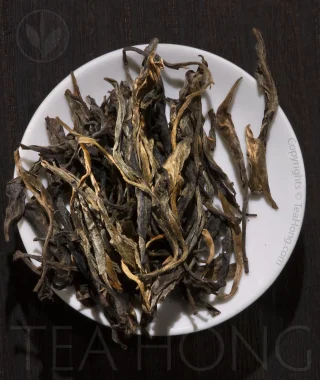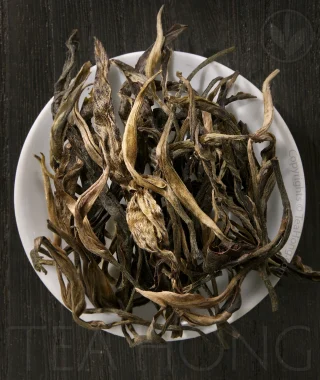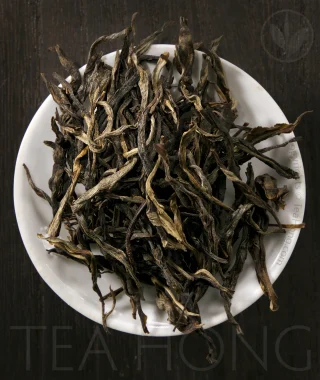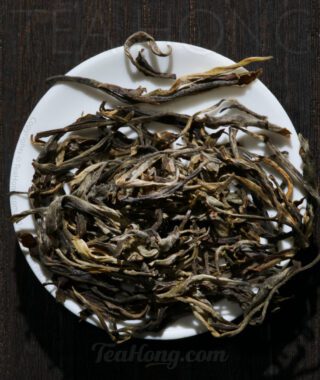-

Yiwu Large Leaf 2013, partially post-fermented Pu’er shengcha
Denser Aromas, Fuller Bodies, Neutral-Cool Energy, Pu'er teas, Tea, Yunnan$ 24.00Natural partially post-fermented Pu'er:
Produced using raw material from Yunnan indigenous trunk tea tree and darkened through optimum maturity, Tea Hong’s Yiwu Large Leaf is not only a fine representation of ancient style dark tea, but also a unique gastronomic experience and a great digestive. Because of our proprietary maturing process, its quality compares superlatively against other shengcha well matured for many longer years. A rare quality to impress without depressing the wallet.


 Net weight: 70 g (2.5 oz) in wide Kraft-alu pack Rated 4.67 out of 5
Net weight: 70 g (2.5 oz) in wide Kraft-alu pack Rated 4.67 out of 5 -

Raw Reserve 2009, partially post-fermented Pu’er shengcha
Denser Aromas, Neutral-Cool Energy, Pu'er teas, Stronger Tastes, Tea, Yunnan$ 12.80Old Style Dark Tea:
Fine pu’er tea produced by darkening shengcha (raw tea, or maocha) naturally through maturity has a distinct and pleasant herbaceous high note. It is a lost art that mass production has come to replace. To deliver the pleasant tasting effect of Tea Hong Raw Reserve requires much specialistic attention in the process that is not common in the trade nowadays. This is what good pu'er used to taste like before controlled post-fermentation.

 Net weight: 50 g (1.8 oz) in Kraft-alu pillow pack
Net weight: 50 g (1.8 oz) in Kraft-alu pillow pack -

Bulang Maocha 2016, Pu’er shengcha
Home, Lighter Aromas, Neutral-Cool Energy, Pu'er loose leaf shengcha, Pu'er teas, Stronger Tastes, Tea, Yunnan$ 15.50Forest Tree Tea:
Deep in the mountains in Xishuangbanna in southern Yunnan tea trees grow wild amongst other woods and plants in Bulang Shan. Ethnic mountain people, particularly women, bring with them wood ladders and a plank for platform for plucking in tea season, perhaps as it has always been since antiquity. As a continuation of this tradition, Bulang Silver Spring is hand-processed and slow dried over wood charcoal the same way. This shengcha puer is bright and refreshing when consumed as a new tea, or can be put away for maturity.



 Net weight: 40 g (1.4 oz) in wide Kraft-alu pack Rated 5.00 out of 5
Net weight: 40 g (1.4 oz) in wide Kraft-alu pack Rated 5.00 out of 5 -

Bang Xie Maocha 2007, Pu’er shengcha
Lighter Aromas, Milder Tastes, Neutral-Cool Energy, Pu'er loose leaf shengcha, Pu'er teas, Tea, Yunnan$ 24.30Whipping Rattan Tea
In historical herbal literature, tea is referred to as bitter, “extremely cold” to the body constituents, but effectively detoxicating. That basically is what is the raw tea leaf. While green tea is cooked, and most white tea is from plants that are severely tamed through breeding, Pu’er maocha maybe the closest thing one can get commercially nowadays for what the ancients had referred to. Yet in order to offer a tea that is taste worthy, we have to find plants that are strong and soil that is rich to provide that potential. And dry those leaves from the first flush and age them well to round off all the edges and deepen the tastes. A Whipping Rattan Tea bush is such pruned that buds just flush in the tips of its few branches. All the plant’s nutrients are thus focused in these few young leaves. We think that would be good raw material for us to process and age. Presenting the very special Whipping Rattan Bang Xie Maocha, aged since 2007. A unique Pu’er tea in every way.



 Net weight: 40 g (1.4 oz) in wide Kraft-alu pack
Net weight: 40 g (1.4 oz) in wide Kraft-alu pack -

Yiwu Maocha 2017, Pu’er shengcha
Cold Energy, Floral Aromas, Pu'er loose leaf shengcha, Pu'er teas, Stronger Tastes, Tea, Yunnan$ 13.90Famous Origin
It is said that the indigenous people in Yiwu Mountain began using tea for its medicinal purposes in the third century. The cure would soon became a beverage habit and later a trading commodity. Regardless of history, Yiwu is indeed one of the most renowned region in Yunnan for the tea’s fragrance. We have discovered a great value batch to share with you for a taste of this character without the usual unreal price tag. By design, there are two younger teas in this Puer Maocha series and this is one of them. Some people like their maocha fresher, while others prefer it aged. Enjoy!


 Net weight: 40 g (1.4 oz) in Kraft-alu pack
Net weight: 40 g (1.4 oz) in Kraft-alu pack -

Bai Hua Shu 2012, shengcha Pu’er maocha
Cold Energy, Floral Aromas, Pu'er loose leaf shengcha, Pu'er teas, Stronger Tastes, Tea, Yunnan$ 33.80One Hundred Flower Trees
Going pass the famous Jingmai tea region and deep into the rocky mountains of Lancang Lahu, 1800m above sea level into the turf of the Haqniq ( aka Hani ) tribes, enter the ancient hermit village of One Hundred Flower Trees ( hence the name Bai Hua Shu ). The tougher climate here maybe a little too rough for domesticated tea cultivars, so only indigenous tea trees grow here, and they are really old. The locals say all are at least 200 hundred years. They are harvested only once a year for their first flush. The fresh tea is always very potent. We have matured it for over 10 years to make sure their beautifully tamed characters can be well manifested in your cup.


 Net weight: 40 g (1.4 oz) in wide Kraft-alu pack
Net weight: 40 g (1.4 oz) in wide Kraft-alu pack -

Moss Island 2018, shengcha Pu’er maocha
Cold Energy, Fuller Bodies, Home, Pu'er loose leaf shengcha, Pu'er teas, Stronger Tastes, Tea, Yunnan$ 21.30Bing Dao Maocha
Leaves from Bing Dao look definitively different as from, say, those of Pasha. It is a different variety of Yunnan Da Ye tea tree1 — Mengku Da Ye (Mengku Big Leaf), that differentiates itself not only with the larger leaf size, but also an accent of crispy sweetness. It is believed that Bing Dao — Island of Moss2 — is the birthplace of the tea tree variety. Variants and cultivars of Mengku Da Ye are used popularly in the county of Mengku3 for both black and pu'er tea production. Some say it began in late 15th century when a governor asked locals to plant 200 seeds here to start tea production. That would become the tens of thousand in this area where the Mengku variety is found to be genetically the most pure. Less than 20% of variation in their DNA, quite impressive for over 500 years of unmanaged sexual propagation in the wild. I think this batch is exceptional in manifesting the characteristics of this unique tea tree. It is a premium harvest. If you are interested, compare this loose leaf form with the compressed form » Bing Dao 2014 that is also available at Tea Hong.
Net weight: 40 g (1.4 oz) in wide Kraft-alu pack




-

Pasha Old Tree 2017, shengcha Pu’er maocha
Cold Energy, Floral Aromas, Fuller Bodies, Home, Pu'er loose leaf shengcha, Pu'er teas, Tea, Yunnan$ 25.70Maocha from Wild Old Trees
Of all the sub-regions in Yunnan, Pasha is my personal favourite for shengcha. Its yields are typically more floral, rounder and sweeter yet still carrying the terra’s characters of a little punch. We have included also a cha bing (Pasha 2013) in our Pu’er offering in addition to this premium harvest loose leaf maocha. Although both are produced with top picks from this same area, the two different forms deliver different, yet somehow related taste profiles. The pure, gentle, direct and honest rawness of the loose leaf is a different kind of enjoyment from the transformed taste characteristics of the compressed form. Similar leaves, two teas. Compare them to find out which one you like better. It may tell a thing or two about yourself. We have matured the loose leaf for 7 years before making it available for a better representation of the true Pasha quality.
Net weight: 40 g (1.4 oz) in wide Kraft-alu pack




-

Western Half of the Mountain, shengcha Pu’er maocha
Cold Energy, Floral Aromas, Pu'er loose leaf shengcha, Pu'er teas, Stronger Tastes, Tea, Yunnan$ 16.90Mengku Maocha 2015 — Mengku Xi Ban Shan
Rough terrains, with altitudes ranging from 1000’s to over 3000 m make up almost 100% of the total 475 km2 of Mengku, in the subregion of Lincang in Yunnan. The uneven landscape is interlaced with huge rocks and subtropical forests. That may explain why for over 500 years the production of tea has been a major means of livelihood for the indigenous tribes here. Old tea trees exist in patches here and there. Sometimes there is a single huge one which immediate surrounding would be cleared for pickers to work during harvests. While leaves from the east side of this cluster of mountains are known for their strong character, those produced on the west side are sweeter, silkier and more gentle. I think the latter is better in the form of maocha. We have matured this batch for 9 years for your better enjoyment, and friendlier to the stomach.
Net weight: 40 g (1.4 oz) in wide Kraft-alu pack




shengcha puer
Products > shengcha puer


